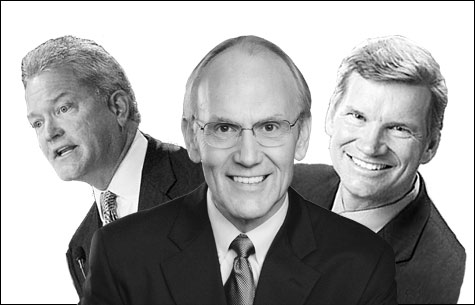
DIRTY LITTLE SECRETS (Left to right) Congressman Mark Foley, Senator Larry Craig, Reverend Ted Haggard’s hypocrisy may have actually emboldened homophobic tendencies. |
DESPERATE TIMES
Larry Craig’s insistence that he wasn’t soliciting sex in that airport bathroom seems absurd, but it pales next to Florida legislator Bob Allen’s excuse. Allen was arrested in July for offering to give an undercover police officer a blow job in a park bathroom (and to pay him $20 for the favor). He subsequently explained that, since the officer and the other men in park were all black, he worried he was “about to become a statistic” and did what he had to to protect himself. Allen is white, obviously. He also has an anti-gay voting record — and, at the time of his arrest, he was John McCain’s Florida campaign co-chair. |
Most big news stories fit the snowball metaphor, with an isolated fact or two slowly gaining significance and momentum over a period of days or weeks. But not the recent political downfall of Senator Larry Craig (R-Idaho) — which, in retrospect, was less like a gradual accumulation of detail and meaning and more like a massive avalanche.On the afternoon of Monday, August 27, the Capitol Hill paper Roll Call posted a story revealing that Craig had pled guilty to soliciting sex in a men’s room in the Minneapolis airport back in June. The next day, with most American dailies rushing to catch up with Roll Call’s scoop, the Idaho Statesman advanced the story with a dauntingly thorough look (300 sources?!?) at longstanding rumors of Craig’s homosexuality. By Wednesday — less than two full days after the story broke — the Statesman was defending both its exhaustive analysis of Craig’s sexual history and its decision to sit on the story until after Roll Call’s report. Meanwhile, the online magazine Slate was treating readers to a detailed video reenactment of Craig’s bathroom kabuki; the New York Times was situating the Craig contretemps in the broader context of current GOP woes; and the whole story was starting to feel played out. When Craig finally announced his resignation on September 1, it felt like it had been preordained for weeks, not mere days.

News moves faster now, of course — but that alone doesn’t explain the explosion of Craig coverage. Instead, a host of factors combined to turn Craig’s travails into a perfect media story. With Labor Day looming, it was a classic slow-news week. What’s more, the story was pegged not to an allegation but to an actual confession — one that was promptly posted online at sites like CNN.com and FoxNews.com, where it joined video of Craig’s awkward press conference (“I am not gay”) and, later, audio of Craig’s post-arrest interview in a nice, tidy multimedia package. And, thanks to the Statesman’s timidity/prudence, that paper’s sexposé was ready and waiting — which, thanks to the Web, meant that national readers quickly had access to the kind of thorough background report that wouldn’t usually have been available for days or weeks.
Finally, there was the eagerness of various Republican presidential hopefuls — competing in the party’s most fluid nominating process in decades — to endear themselves to the GOP’s base by condemning Craig’s bathroom behavior. So it was that former Massachusetts governor Mitt Romney — a self-styled champion of “traditional values” and inveterate gay-marriage basher who had tapped Craig as his Senate campaign co-chair — pulled an endorsement from Craig off his campaign Web site, deleted Craig’s name from campaign press releases, and, for good measure, rushed to condemn Craig’s behavior to any political journalist who was willing to listen — or so it seemed.
Given all these contingencies, the Craig Affair only goes so far as a model for how stories develop in the 21st century. But there is a bigger lesson here — namely, the extent to which private sexual behavior (or, more precisely, a certain type of private sexual behavior) has come to be regarded as legitimate news fodder.
After all, the Statesman’s investigation was prompted by an October 2006 post by Mike Rogers, whose blog, BlogActive.com, is dedicated to outing politicians who oppose gay rights. (In November 2006, Rogers explained his approach to the Phoenix; with some exceptions, he believes that closeted anti-gay politicians are inherently newsworthy.) Unlike other Idaho dailies, the Statesman wasn’t comfortable reporting on Rogers’s outing of Craig — which was based on anonymous sources — when it first occurred. But it did decide that Rogers’ report contained the germ of a legitimate news story. And while the Statesman wasn’t comfortable publishing its own investigation prior to Roll Call’s scoop, it was perfectly willing to do so afterward.
There is, of course, a major difference between an allegation and an admission, which is exactly what Craig provided back in June, even though he’s now changed his tune. Still, Rogers and the Statesman — an activist blogger and a mainstream daily, respectively — seem to share a broader agreement on the newsworthiness of Craig’s private sexual behavior.